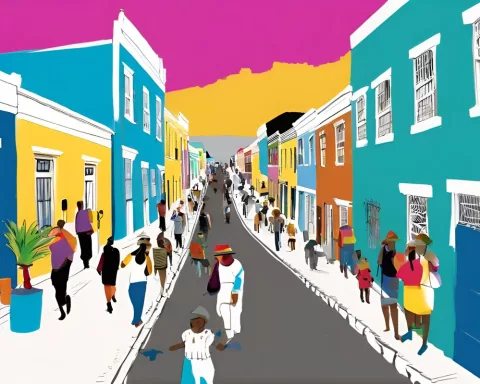Over the past ten years, South Africa’s academic landscape has undergone a remarkable transformation as rising universities like the University of Johannesburg and Stellenbosch University challenge traditional academic leaders. This shift highlights a significant change in the country’s academic panorama, with universities previously thought of as underdogs making significant strides forward. These changes are reflected in global rankings, with several South African universities making a name for themselves on the international stage. Looking forward, the future of South African academia is bright, with a dynamic and evolving environment anticipated.
What is the dramatic shift in South Africa’s university landscape over the past ten years?
South Africa’s academic realm has transformed over the past decade, with rising universities like the University of Johannesburg and Stellenbosch University challenging traditional academic leaders like the University of Cape Town and the University of the Witwatersrand. Other universities previously ranked lower, such as the University of South Africa, have also made significant strides forward. This shift underscores a significant change in the academic panorama of South Africa.
The Changing Face of South Africa’s Academic Landscape
Over the past ten years, South Africa’s academic landscape has seen substantial changes. The University of Cape Town (UCT) and the University of the Witwatersrand (Wits) have held their ground as the country’s leading educational institutions. However, the academic realm of South Africa is not fixed – it is an ever-changing environment, perpetually transforming and developing. An in-depth examination of recent data uncovers an intriguing narrative of tenacity and expansion, particularly among universities previously thought of as underdogs.
In the past, UCT and Wits have maintained a superior position over other South African universities. However, the past decade has seen these institutions struggle with stagnation and, in some aspects, decline. This apparent lack of significant progression, as reflected through university rankings, stands in stark contrast to the remarkable ascension of other national universities.
Rising Universities Asserting Their Presence
The University of Johannesburg (UJ) stands out as a beaming exemplar of this shift. Demonstrating scholastic excellence and institutional robustness, UJ has ascended the ranks of the QS World University Rankings for 2025, securing a spot among the top five. This accomplishment is made even more striking when considering UJ’s enormous leap of 327 places in the Centre for World University Rankings list for 2024. This ascent designates UJ as the most improved among all locally ranked institutes – a testimony to its dedication to enhancement and progression.
Adding another dimension to this unfolding tale, [Stellenbosch University (SU)](https://capetown.today/fostering-safety-initiatives-in-stellenbosch-a-joint-effort-by-premier-alan-winde-and-mec-reagen-allen/) has come forward as South Africa’s third-best university, trailing only UCT and Wits. The previous decade has seen a fierce rivalry between SU and the University of KwaZulu Natal (UKZN), with SU recently outpacing UKZN in the race for academic supremacy.
Growth Across the Board
It’s not only the traditionally competitive universities that have made strides. Universities that were previously ranked lower, such as the University of South Africa (Unisa), have made considerable leaps forward. This accomplishment illustrates that growth and progress are achievable, regardless of a university’s initial position.
The latest QS World University Rankings (QSWUR) includes 11 local universities among the world’s finest. Six of these esteemed institutions are in the top 1000 globally, a testament to the quality of education provided by South African universities. These rankings take into account various factors, including research, employability, and sustainability.
Global Recognition and Local Transformation
The Centre for World University Rankings (CWUR) for 2024 presents another compelling narrative. The leading three spots were claimed by American universities – Harvard University, the Massachusetts Institute of Technology, and Stanford University. The CWUR, which has been publishing rankings since 2012, assesses education quality, employability, faculty quality, and research output.
South African universities first appeared on the CWUR ranking in 2014. Since then, several local institutions have shown significant improvements. Interestingly, while UCT, Wits, SU, and UKZN have experienced a decline in rankings over the past ten years, the University of Johannesburg (UJ), North-West University (NWU), and the University of the Free State (UFS) have risen.
The Future of South African Academia
The transformation of South African universities over the past decade underscores a significant shift in the academic panorama. A new breed of institutions, once considered dark horses, are now ascending to prominence, challenging the established order. The future of South African academia is indeed promising, anticipating a dynamic and persistently evolving environment.
1. What universities are challenging the traditional academic leaders in South Africa?
Rising universities like the University of Johannesburg and Stellenbosch University are challenging traditional academic leaders like the University of Cape Town and the University of the Witwatersrand.
2. How has the academic landscape of South Africa changed over the past decade?
The past decade has seen an intriguing narrative of tenacity and expansion, particularly among universities previously thought of as underdogs. Universities previously ranked lower, such as the University of South Africa, have made significant strides forward.
3. What is the most improved university among all locally ranked institutes in South Africa?
The University of Johannesburg (UJ) is the most improved among all locally ranked institutes – a testimony to its dedication to enhancement and progression.
4. How many South African universities are among the world’s finest, according to the latest QS World University Rankings (QSWUR)?
The latest QS World University Rankings (QSWUR) includes 11 local universities among the world’s finest. Six of these esteemed institutions are in the top 1000 globally.
5. What is the Centre for World University Rankings (CWUR) and how has it recognized South African universities?
The CWUR, which has been publishing rankings since 2012, assesses education quality, employability, faculty quality, and research output. South African universities first appeared on the CWUR ranking in 2014. Since then, several local institutions have shown significant improvements.
6. What is the future of South African academia?
The future of South African academia is bright, with a dynamic and evolving environment anticipated. A new breed of institutions, once considered dark horses, are now ascending to prominence, challenging the established order.












